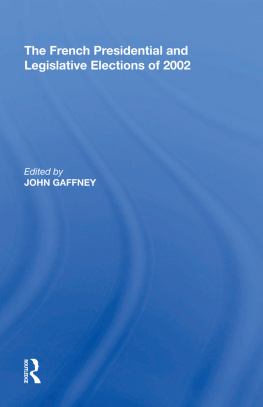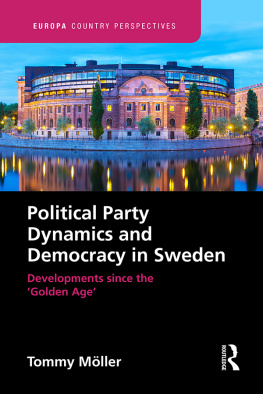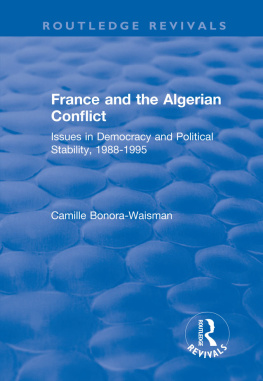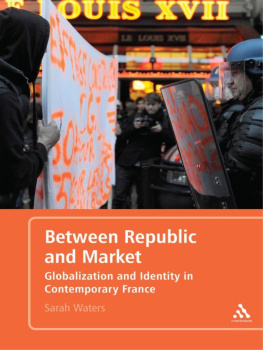ROUTLEDGE LIBRARY EDITIONS: GERMAN POLITICS
Volume 8
POLITICAL CULTURE IN FRANCE AND GERMANY
Political Culture in France and Germany
Edited by
John Gaffney and Eva Kolinsky
First published in 1991
This edition first published in 2015
by Routledge
2 Park Square, Milton Park, Abingdon, Oxon, OX14 4RN
and by Routledge
711 Third Avenue, New York, NY 10017
Routledge is an imprint of the Taylor & Francis Group, an informa business
1991 John Gaffney and Eva Kolinsky
All rights reserved. No part of this book may be reprinted or reproduced or utilised in any form or by any electronic, mechanical, or other means, now known or hereafter invented, including photocopying and recording, or in any information storage or retrieval system, without permission in writing from the publishers.
Trademark notice : Product or corporate names may be trademarks or registered trademarks, and are used only for identification and explanation without intent to infringe.
British Library Cataloguing in Publication Data
A catalogue record for this book is available from the British Library
ISBN: 978-1-138-83837-6 (Set)
elSBN: 978-1-315-72630-4 (Set)
ISBN: 978-1-138-83839-0 (Volume 8)
elSBN: 978-1-315-73437-8 (Volume 8)
Publisher's Note
The publisher has gone to great lengths to ensure the quality of this reprint but points out that some imperfections in the original copies may be apparent.
Disclaimer
The publisher has made every effort to trace copyright holders and would welcome correspondence from those they have been unable to trace.
Political Culture in France and Germany
Edited by
John Gaffney and Eva Kolinsky
First published by Routledge 1991
11 New Fetter Lane, London EC4P 4EE
Simultaneously published in the USA and Canada
by Routledge
a division of Routledge, Chapman and Hall, Inc.
29 West 35th Street, New York, NY 10001
1991 John Gaffney and Eva Kolinsky
Printed and bound in Great Britain by Mackays of Chatham PLC, Kent
All rights reserved. No part of this book may be reprinted or reproduced or utilized in any form or by any electronic, mechanical, or other means, now known or hereafter invented, including photocopying and recording, or in any information storage or retrieval system, without permission in writing from the publishers.
British Library Cataloguing in Publication Data
Political culture in France and Germany: a contemporary perspective.
1. Europe. Politics, history. Cultural aspects
I. Gaffney, John, 1950- II. Kolinsky, Eva 320.94
ISBN 0-415-02321-1
Library of Congress Cataloging-in-Publication Data
Political culture in France and Germany: a contemporary perspective / edited by John Gaffney and Eva Kolinsky.
p. cm.
Includes bibliographical references.
ISBN 0-415-02321-1
1. Political cultureFrance. 2. FrancePolitics and government1958- 3. Political cultureGermany (West) 4. Germany (West)Politics and government I. Gaffney, John, 1950II. Kolinsky, Eva.
JN2594.2.P64 1990
306.2'0944dc20
90-8417 CIP
Contents
| Eva Kolinsky and John Gaffney |
| John Gaffney |
| Eva Kolinsky |
| James G. Shields |
| John Gaffney |
| Pamela M. Moores |
| Susan Hayward |
| Mark Roseman |
| Eva Kolinsky |
| Michael Townson |
- ASF Arbeitsgemeinschaft Sozialdemokratischer Frauen
- CDU Christlich-Demokratische Union
- CGT Confdration gnrale du travail
- CSU Christlich-Soziale Union
- DGB Deutscher Gewerkschaftsbund
- DNVP Deutschnationale Volkspartei
- DVP Deutsche Volkspartei
- EEC European Economic Community
- FDP Freie Demokratische Partei
- FN Front National
- KPD Kommunistische Partei
- NDP National Demokratische Partei
- NSDAP Nationalsozialistische Deutsche Arbeiterpartei
- OAS Organisation de larme secrte
- PCF Parti communiste franis
- PS Parti socialiste
- RPF Rassemblement du peuple franais
- RPR Rassemblement pour la rpublique
- SA Sturmabteilung
- SMIC Salaire minimum interprofessionnel de croissance
- SPD Sozialdemokratische Partei
- UDF Union pour la dmocratie franaise
Eva Kolinsky and John Gaffney
The modern political histories of France and Germany bear the benchmarks of apparently conflicting and distinctly different political cultures. Traditional contrasts between society and community, between political polarisation and consensus, between confrontation with and subservience to the state all imply that, in France, social and political conflict has been central to the political process while in Germany system allegiance has held prime of place.
In the contemporary setting of both political cultures, the traditional demarcation lines of conflictual or consensual politics are becoming blurred as social mobility and economic changes have modified cleavages and blunted partisan positions. Indeed, from a comparative perspective a certain inversion seems to have taken place. In France, the political cohabitation between right and left and its legacy point to a new relevance of consensus, and to new patterns of collective participation which do not tally well with the traditional view that conflictual individualism constitutes the moving force and the social basis of politics. In West Germany, the opposite appears to be happening. New modes of participation, electoral realignments, and the emergence of issue-based politics at both parliamentary and extra-parliamentary level have reduced the centrality of the formal political process and the dominant place of consensus in the political culture. Paradoxically, therefore, the two polities, the one moving away from individualism, the other towards it, are in certain key respects coming closer together. This does not mean that inherited or acquired social, political and cultural traits are levelling into a melee-culture of advanced industrial politics with a supranational or European flavour. Drawing on national legacies and cultural specificities, the link between citizen and polity remains distinctive in each country as the contemporary political cultures are recast towards a relative system consensus in France, and a relative conflict and individualism in West Germany.
French Perspectives on Political Culture
The development of the study of political culture in representative democracies has been greatly influenced, even determined for decades, by Almond and Verba's seminal work The Civic Culture (1963). France, however, was omitted from their five nation comparison as a country too exposed to regime confusion to offer a focus on the attitudes which might underpin the institutional structure and stability of democratic political systems (Almond and Verba, 1980). At the time of Almond and Verba's research in the 1950s, France was undergoing a major political crisis involving the collapse of one regime, the Fourth Republic (1946-58) and the establishment of the Fifth. We can observe in passing that the analysis of such a democratically discordant voice would, nevertheless, have offered some fascinating insights. The study and the omission were based on two related and influential assumptions. The first was that relative system stability was necessary for the assessment of degrees of allegiance to the democratic process. This is, arguably, an uncontentious point, of methodological rather than of any wider significance. The second, however, has wider implications for the way in which democratic allegiance should itself be conceptualised, in that it took as relatively unproblematic the notion of allegiance to (or acceptance or approval of) some kind of political, social and possibly ideological status quo. Such a view raises not only questions of a political or value-judgemental nature but also those concerning the social and political dynamics of a given democracy, how these are to be measured, and the analytical framework within which analysis is set.












